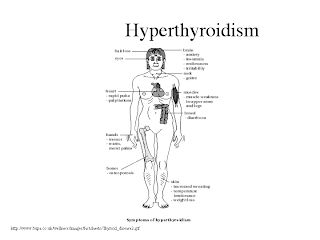Hyperthyroidism is the commonest endocrine problem you will see during your practice either you are in endocrine unit or general medicine.
Therefore, I think you must learn hyperthyroidism well and it is commonly asked in your MRCP/USMLE examination as well.
Common causes of hyperthyroidism are Grave’s disease, toxic multinodular goiter and toxic nodule (adenoma). You will most probably seeing mostly Grave’s disease as the cause of your patient’s hyperthyroidism especially among younger female patients.
Anyway, first thing to remember in your MRCP, there are a lot of drugs that can cause hyperthyroidism and two commonly asked drugs are Lithium and amiodarone. I have talked about amiodarone in my previous post. Learn this drug hard because it is important and a popular drug in your exam.
OK, to learn about the signs and symptoms of hyperthyroidism, it is rather logicaland easy to remember. It is an important metabolism hormone, therefore when there is an increased level of thyroid hormone, everything in your body is increased- your heart rate, your metabolism rate, your gut peristalsis etc. Therefore, you anticipate patient to compliant palpitation, weight loss and diarrhoe. Depending on whether patient has Grave’s disease, you may get some eye symptoms and signs.

However, as a medical student before, I remember that everything in hyperthyroidism is increased except patients have reduced power ( proximal myopathy) and female patients may have less/reduced menses ( amenorrhoea). Remember as well urticaria can develop in hyperthyroidism.
Another thing to remember, a lot of young patients with hyperthyroidism have a lot of symptoms but always older patients with hyperthyroidism appear to be ‘silent’ ( no symptoms) and they always present with just atrial fibrillation or symptoms suggesting heart failure.
One lesson to be learned here, always check patient’s thyroid function if you can’t find out the underlying cause of patient’s heart failure especially among older patients.
Learn how to interpret thyroid function test ( easy, T3 or T4 is high with low TSH suggest hyperthyroidism), however, remember the side effects of anti-thyroid drugs.
Two important side effects to remember- agranulocytosis and skin rash. It is your duty to check patient full blood count after you start them on anti-thyroid drugs because patient may later come to you’re A+E with leucopenic sepsis due to carbimazole!
